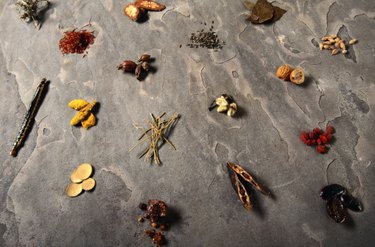
Many disorders, common irritants and microbes can cause lung congestion. High blood pressure or heart problems can fill your lungs with fluid because your heart isn't pumping properly. Allergies and air pollution cause your bronchial tubes to increase mucous production. Upper respiratory infections, such as bronchitis, produce inflammation, phlegm and mucus. If your lungs are congested, you may experience coughing, wheezing and tightness in your chest. See a doctor immediately for a proper diagnosis, since the problem may be life-threatening, and get his advice before starting herbal treatment.
Herbal Actions
Video of the Day
Herbal teas can help clear your lungs in several ways. Some herbs have expectorant action and will help your lungs loosen and expel the mucous secretions causing congestion. Antimicrobial herbs will treat any underlying infection causing mucous buildup. Heart tonics may strengthen your heartbeat and reduce lung fluid. Check with a knowledgeable practitioner for advice about dosage and preparation of herbal teas to clear your lungs.
Video of the Day
Elecampane
Elecampane, or Inula helenium, is a tall perennial with yellow flowers, native to the Mediterranean. Herbalists use the rhizomes and roots to treat coughs and bronchitis. The active ingredients include mucilage, essential oil and elecampane camphor, which has antibiotic and expectorant actions. In his 2003 book, "Medical Herbalism: The Science and Practice of Herbal Medicine," clinical herbalist David Hoffmann says that elecampane is useful whenever excessive bronchial catarrh is present, as in bronchitis, asthma or emphysema. The essential oil stimulates cough to expel mucus and phlegm, and clear the lungs. Do not use this herb if you have allergies to plants in the Aster family.
Hawthorn
Hawthorn, or Crataegus laevigata, is a small thorny shrub with red berries. It has a long history of medicinal use as a heart tonic. A strong heartbeat reduces the chance of fluid building up in your lungs, so heart tonics like hawthorn can help keep your lungs free from mucous congestion. In their 2009 book, "Medicinal Plants of the World," botanist Ben-Erik van Wyk and biologist Michael Wink state that hawthorn's active ingredients are flavonoids and procyanidins, which are involved in strengthening heart contractions and reducing arrhythmia. Hoffmann says that hawthorn improves coronary circulation and increases heart muscle contractions. Do not combine hawthorn with other heart or blood pressure medications.
Thyme
Thyme, or Thymus vulgaris, is an aromatic herb used in cooking and medicine. Traditional healers use the leaves and flowers to treat upper respiratory infections. Thyme contains thymol, a potent antibiotic, and polymethoxyflavones and terpenes, which have anti-inflammatory and anti-tussive properties. In their 2000 book, "The Herbal Drugstore," Dr. Linda B. White and medicinal plant expert Steven Foster recommend thyme tea as an expectorant and antibacterial herb for bronchial congestion. Hoffmann also recommends it for congestion due to asthma and whooping cough. Do not use it if you are pregnant.